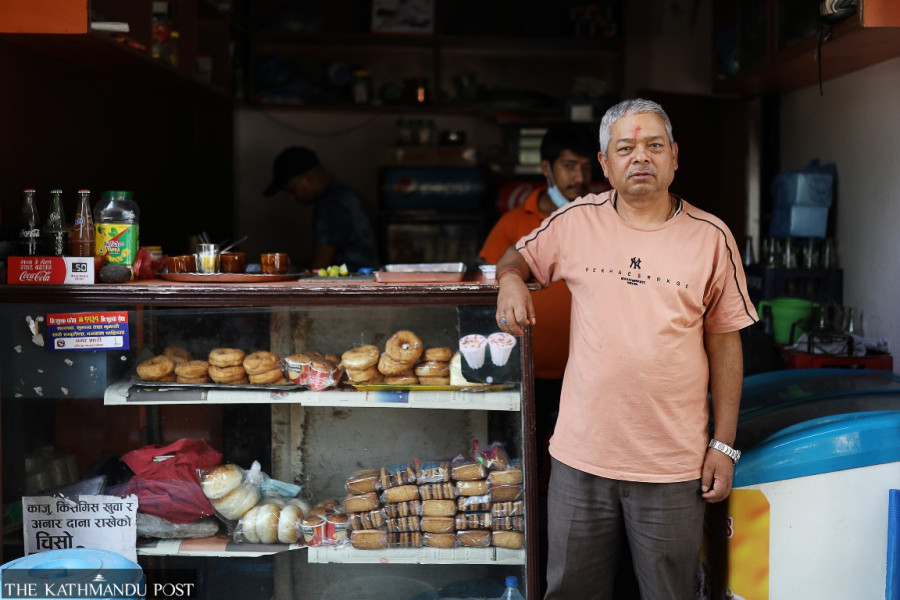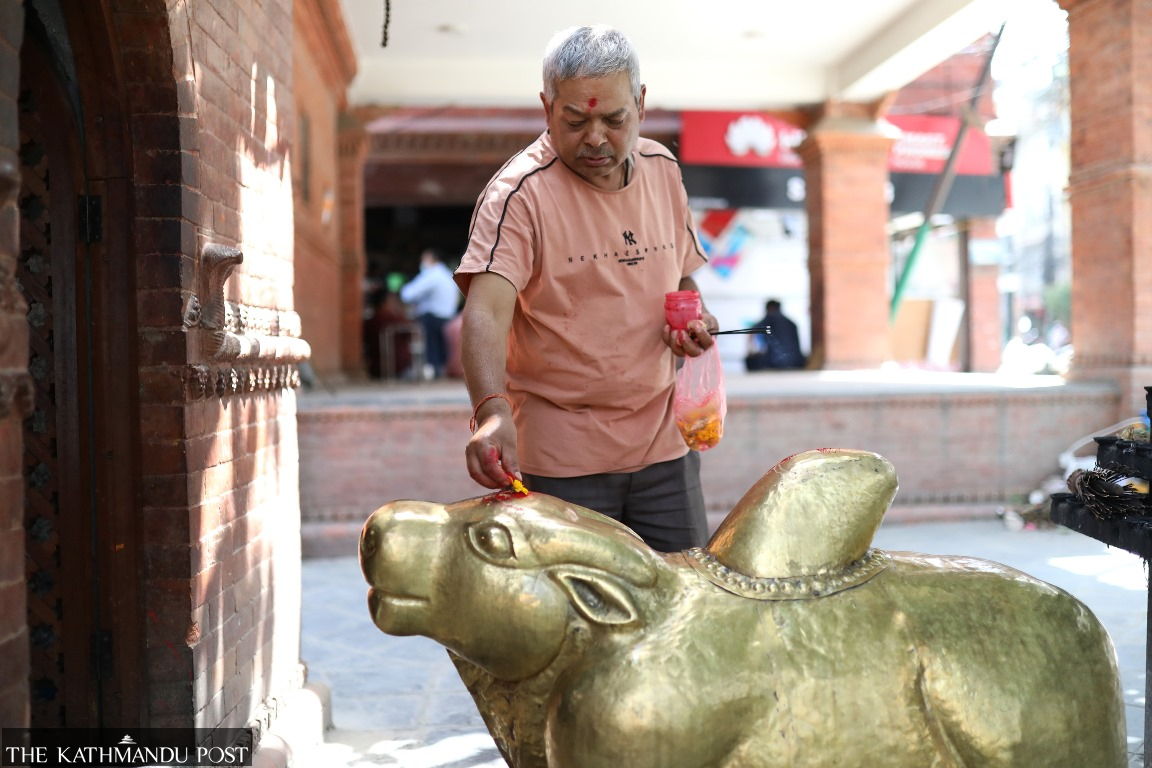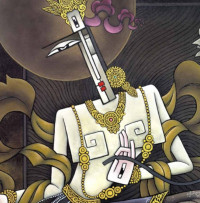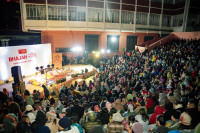Culture & Lifestyle
Over a cup of tea
For more than 30 years, Roshan Basnet, a fireman turned tea seller, has brewed countless cups of tea in his inconspicuous chiya pasal.
Shranup Tandukar
As dusk slowly settles on a public park just in front of the Lalitpur Metropolitan City office, the park starts to brim with communal life: mothers bringing their small children to play, people bringing their pet dogs for walks, couples cosying up with each other, and people sipping tea and sharing conversations. Just beside the park, there is a small temple of Hindu deity Mahadeva and a falcha (a Nepalbhasa term for traditional Newa rest stops), where the conversation topics range from juicy gossip to exciting life updates to slightly absurd political conspiracy theories.
Just in front of the falcha stands a small, slightly cramped tea shop from where most people resting in the falcha satisfy their cravings for warm tea over comforting conversations. The tea shop is fronted by a window-display of snacks and assortments to accompany tea: from buns and bread to donuts and muffins, the price range starting from Rs 15 to Rs 50. Inside the shop, there are two gas stoves which are occupied almost all the time in the mornings and evenings. A fridge beside the stoves carries pots of chilled homemade lassis, a popular item on the menu during summers.
As people in the park and the falcha talk their time away, Roshan Basnet, the 63-year-old owner of the teashop, spends his days brewing cups of tea after tea from early mornings to late evenings. A year ago, his son-in-law Sushil Thapa also started helping him take care of the shop.
While Basnet has spent the last thirty years brewing tea to make a living, he made his first attempt at this business when he was only 14. This decision to start his own tea shop at such a young age, says Basnet, was necessitated by the fact that the money was tight in his family.
With Rs 60 that he got from a relative, he bought all that he needed to start his tea shop such as a stove, tea leaves, and food ingredients. But the venture didn’t last long.
“I was too young back then,” he reminiscences. “I didn’t know the intricacies of brewing tea; how to adjust the cooking time according to the thickness of the milk, how much colour to bring out from tea leaves, how to add just the right amount of sugar. It took me a long time to understand how to brew a good cup of tea.”
But along with the expertise needed to brew tea, Basnet also needed to understand how to read people and their preferences. A tea shop acts as a regular meeting spot full of lively social interactions in close-knit communities. For a tea shop to continue to attract such interactions, the tea shop owner needs to be mindful of people’s preferences, he says. When he started his first tea shop at a young age, he lacked these skills, and his tea shop closed its doors after three years.

In 1981, Basnet made his way into Kathmandu with hope in his eyes. He didn’t have a specific work skill or a job planned, but he approached his father’s friends who were employed in government offices, and he was able to land a job as a fireman in the Kathmandu Fire Brigade. However, the working environment there wasn’t healthy, and he soon transferred to the Bhaktapur’s fire station, where he faced a similar situation. He again transferred to the Lalitpur’s fire station at Damkal Chowk, Pulchowk, where he met amicable colleagues and a pleasant working environment.
The first station is just across the street and a few blocks away from Basnet’s tea shop. “It was a difficult occupation,” says Basnet, remembering his days as a fireman. “There was no option for us to be scared or to shy away from dangerous situations. People would be dying or suffering, and we had to shut off all instincts and dive headfirst into fires. As soon as the fire signal would ring, you had to get ready and board the truck within seconds. It was a relentless and arduous job where you had to be on alert for 24 hours a day.”
The hours were long and the physical toll heavy, but the pay was still meagre. To supplement his income, Basnet took over a tea shop right opposite the fire station. He would work at the tea shop, and whenever the fire signal would ring, he would drop everything and rush to wear his gears and get into the firetruck. This hectic lifestyle lasted for six years, and when his friend rented a space beside a falcha, Basnet jumped at the opportunity to open another tea shop. Since the tea shop was a distance away and no one else was there to help manage it, Basnet closed his life’s chapter of being a fireman.
The first two tea shops that Basnet managed were without names. Rather than the name of the shops, customers were more interested in the people who would own and manage the shops. But when Basnet started the third iteration of his tea shop, he named it after himself: Roshan Chiya Pasal. A board was placed on top of the shutters with the name, but when the board fell down one time, Basnet didn’t feel the need to replace it.
“I had already started having a loyal following of patrons who would visit almost every day, and most people would refer to my tea shop as ‘baje ko chiya pasal’ instead,” says Basnet.
After opening the shop in 1992, time seems to have stood still for this small, inconspicuous teashop. The prices for black and milk tea are perhaps the lowest that one will find anywhere in the Valley: Rs 10 for black tea, Rs 20 for black coffee, Rs 20 for milk tea, Rs 50 for milk coffee, Rs 30 for special tea(milk tea with masala and coffee sprinkles), and Rs 90 for lassi.
“I know Rs 10 is standard for black tea only in villages nowadays, but even teashops at my village sometimes charge me Rs 15 for black tea,” admits Basnet, who is originally from Suryabinayak, Bhaktapur. The thought of estranging his decades-old patrons has put the thoughts of increasing the prices at bay till now. But, he doesn’t know if he can continue his disregard for rising inflation for long.
“Milk prices have risen three times already in the last few years, sugar prices are climbing up, and it’s the same for tea leaves,” says Basnet. “I have intended to raise the prices for a while, but I still have never gotten around it. Even with the rising prices of everything else, I haven’t gone into loss yet, so I see no urgency too.”
In daylight hours, if Basnet isn’t found inside the comforts of his tea shop, then he is almost always found at the Mahadeva temple, besides the falcha. As a devotee of Mahadeva, Basnet was distraught that the Mahadeva temple wasn’t taken care of by anyone when he first started renting the tea shop.
“I am not a trained priest, nor do I have a birthright to the priesthood, but when I saw the temple premises dirty and the temple itself in disrepair, I started cleaning and taking care of the temple,” says Basnet.
Though people from social organisations and government offices have approached him to provide him with a regular stipend for taking care of the temple, he has refused all of them. He believes that he started taking care of the temple and its premises out of his own will, and he will continue to do it as long as he can, a philosophy that seeps into his future goals for the tea stop too.
“My daughters and wife now beg me to stop working so hard even when I have turned so old, but I don’t think I can stop. Brewing tea and taking care of the temple makes me feel that I am mentally and physically active,” shares Basnet.
There’s something comforting in conversations carried over rustic tea with loved ones as the last sun rays fade over unseen hills. While Basnet rarely partakes in the enjoyment of sipping tea, he nevertheless always takes pleasure in making it. “Sometimes, I feel that maybe I was sent by God to only make tea in life,” says Basnet with a tinge of sadness as well as pleasure. “But life is not about material things, and it took me a long time to grasp this concept. With my small shop and my honest living, I am satisfied with life.”




 14.12°C Kathmandu
14.12°C Kathmandu















